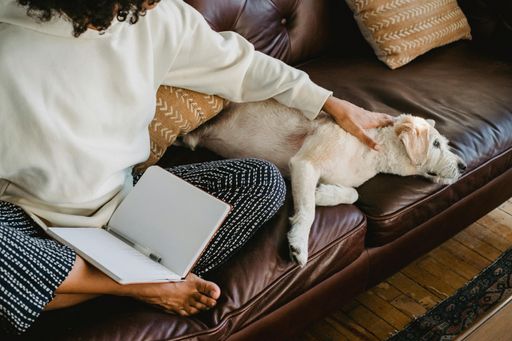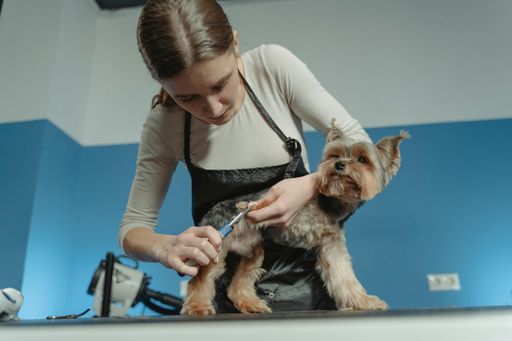Who gets the dog in a divorce? Although it's not a question anyone likes to think about, it is a question that often comes up when two people decide it's time to move forward as individuals.
But unlike a house or a car or some other piece of property that can be sold or divided, the family dog is just that— family. So when the family creases to exist, where does that leave the dog?
There's no right or wrong answer set in stone, at least not by any experts, about what's best for our furry friends. We know that they enjoy companionship, but like humans, their personalities and needs vary. One dog may crave a stable routine and setting while another is more adaptable.
Is it best to leave your dog with one caregiver, or is it okay to split canine custody? Ultimately, the decision is up to you and your spouse, but here are some points that might help you decide who gets to keep the dog after divorce.
Come to an Agreement
Ideally, you and your spouse should agree about who gets the dog in a divorce. Defeating Divorce suggests taking the situation to court will only add stress and a possible unfavorable outcome to the problem.
Under the law, your dog is personal property, no better or worse than the flat-screen t.v. or set of kitchen knives. The judge may think your fur baby is cute, but she won't have the same emotional attachment, and she won't care about a pet custody dispute the same way you will.
The court will traditionally deal with dogs and divorce. In most states, this means the laws benefit the owners, although some states are changing their rules to protect the pet's best interests. So in many cases, if you take your dispute to court, you might as well be fighting for rights to the couch.
It's in everyone's interest, including your dog's, to agree about who will keep the dog.
Daily Schedules and Routines
When deciding who gets the dog in a divorce, consider each other's daily schedules and routines. How long are each of you at work? Which of you has more tasks and activities on your daily to-do list?
If you're out of the house for most of the day and can't show your dog the kind of attention he or she needs, maybe your ex-spouse should keep the dog or vice versa. If your dog is already used to a specific routine, consider who will be best able to continue that routine or something similar.
Travel
Does one of you travel more than the other? Whether for work, vacation, or a hobby, if you plan on traveling for extended lengths of time, it's probably best if your ex-spouse keeps the dog. Otherwise, your dog will be spending more time at a kennel or with a pet sitter than he or she will with you.
Ownership
Does one of you own the dog? Did you or your ex-spouse bring the dog into the marriage? You may feel that regardless of who technically owns the precious pup that he or she is family now, but in the case of divorce, the dog must go with someone. Considering who owns the dogs or invested more money into dog care may help you decide who gets to keep him or her.
Bonding
Has the dog bonded with one spouse over the other? Maybe one of you raised the dog from puppyhood or has more time to spend with the dog now. Whatever the case, if your pet clearly prefers one owner over the other, then that's who should keep the dog.
Children
If there are children involved and they are attached to the dog, it might be best for the dog to live wherever the children live.
Multiple Pets
Do you have multiple dogs or pets? If so, there are a few things to consider.
- Can each of you take one of the pets?
- Does your dog have a particular bond with the other dog/pet? If so, you'll need to think about keeping them together.
In the latter situation, consider which partner is equipped to care for multiple dogs/pets.
Moving Out
If it's more beneficial for your dog to stay in the same home, remaining with the spouse who isn't moving out may be the best option. Some dogs may not positively handle change and transition.
If you know your dog is prone to sickness, anxiety, or destructive behavior during moves or other significant changes, consider leaving the dog with the person who is keeping the family home.
Compromise
You and your ex-spouse can also make caregiving compromises if you think it would work for everyone's lifestyles, including your pets. This might look like:
- One person gets the dog for one month, one week, etc., then transfers care to the other person for one month or one week.
- The dog has a primary caregiver, but the other person has visitation rights.
- One person gets the dog on weekends.
It's essential to consider your dog's needs and how he or she would respond in these kinds of situations. You might not know until you try, so stay open and flexible to tweaking the arrangement and remember to keep your dog's best interests in mind.
Final Thoughts
Divorce is hard enough on its own, but pets and divorce is a challenging combination. Even if the split is amicable, deciding who gets the dog in a divorce can cause emotional distress for the owners and pets.
During a divorce, routines may change, and stress and anxiety levels may rise for everyone, including the dog. Even when the going gets tough, it's beneficial to consider how the change impacts your family pet and do your best to ease your dog's transition.
One last crucial thing to remember is that even if you don't end up keeping the dog, there's no reason to resent your ex-spouse because he or she is providing your pet with a loving, stable home.



















